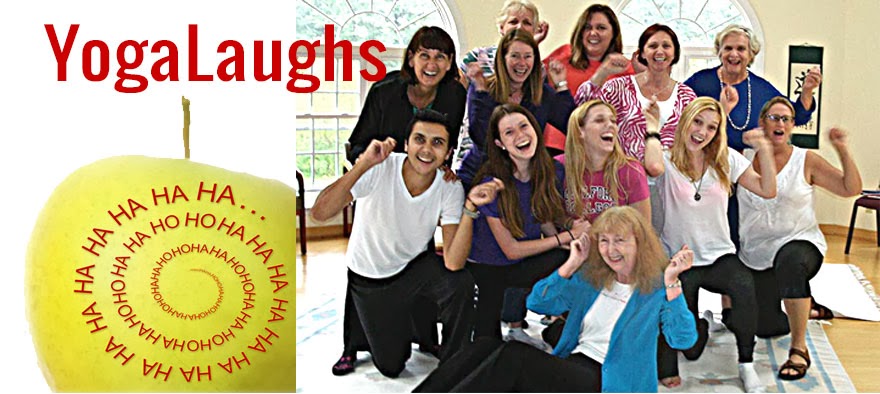"Laughter is inner jogging.” - Norman Cousins
Have you ever laughed so hard, you're not laughing anymore? It's just one giant gut muscle contraction?
These two women work together and were laughing so hard at the end of the Laughter Yoga Leader Training last August -- they couldn't actually laugh much:
Not only does this "gut workout" give your organs a flood of fresh oxygen, a deep massage and a detoxing squeeze, it stimulates the release of serotonin. According to recent research, 95 percent of the body's serotonin is found in the bowels.
Serotonin is often called, the "confidence molecule."
From Pyschology Today: Serotonin plays so many different roles in our bodies that it is really tough to tag it. For the sake of practical application I call it “The Confidence Molecule.” Ultimately the link between higher serotonin and a lack of rejection sensitivity allows people to put themselves in situations that will bolster self-esteem, increase feelings of worthiness and create a sense of belonging.
Serotonin is often called, the "confidence molecule."
From Pyschology Today: Serotonin plays so many different roles in our bodies that it is really tough to tag it. For the sake of practical application I call it “The Confidence Molecule.” Ultimately the link between higher serotonin and a lack of rejection sensitivity allows people to put themselves in situations that will bolster self-esteem, increase feelings of worthiness and create a sense of belonging.
People who attend weekend laughter yoga leader trainings leave glowing with relaxation and confidence. I wish I had before and after pictures! This isn't because we're such great trainers. It's their own prolonged laughter that does this work for them.
A deep breathing exercise ER nurses ask patients having panic attacks to do: Breathe deeply, expanding gut muscles down into the bowels, as if trying to push out poop (sorry for the gross factor). The patient is asked to fully engage the bowels and pelvic floor muscles. Why? This releases the serotonin in the bowels. The expansion and release of the diaphragm and gut muscles also trigger the vagus nerve, which then activates the parasympathetic nervous system, bringing calm and relaxation. Nurses find this kind of breathing is hugely effective to calm down the sympathetic nervous system (fight or flight) driving the panic.
Could Laughter Yoga be the new Prosac? When I laugh regularly in laughter yoga sessions, the process undeniably lifts depression and shifts my perspective to the "lighter side" of life.
"Life is easier when you're laughing." - Dr. Madan Kataria, Founder of Laughter Yoga.
Read more about your "Backup Brain" here.
Read more about The Neurochemicals of Happiness here.



